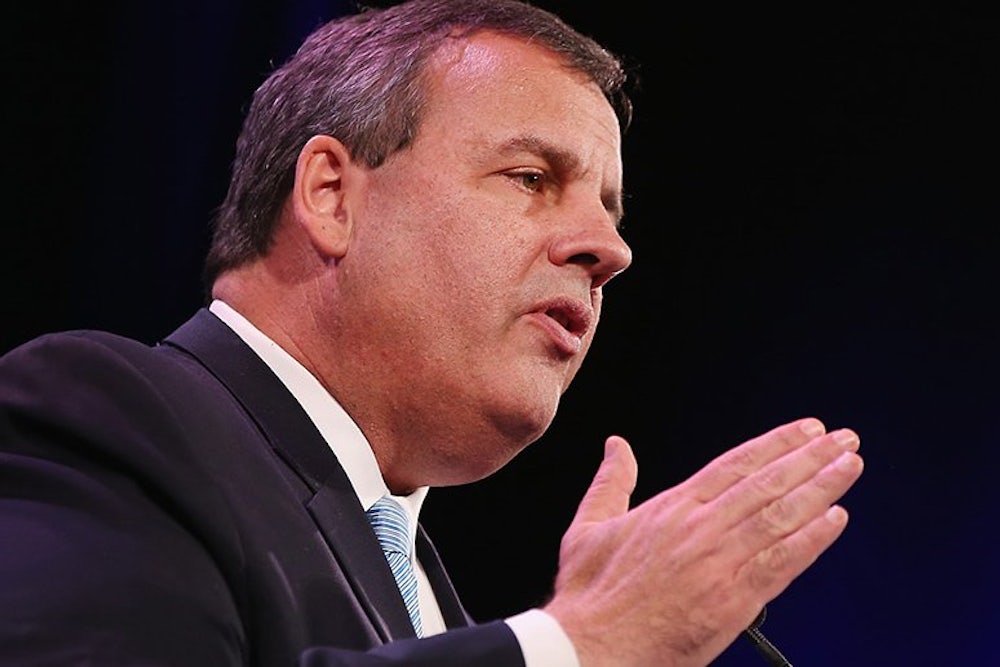During his visit to the United Kingdom, Republican Governor Chris Christie has taken some time to address a measles outbreak now spanning several states, announcing that parents should have “some measure of choice” when it comes to childhood vaccinations. In the U.K., parents have a great deal of choice when it comes to vaccines, and vaccination rates are presently at their highest in decades there. On mandatory vaccinations, Christie went on to argue that “there has to be a balance and it depends on what the vaccine is, what the disease type is, and all the rest.” But Christie's emphasis on choice comes as a shallow appeal during this present outbreak, when irresponsible parental choices have done a disservice to many sick kids.
The New Jersey governor’s take on vaccines is a sharp break from President Obama’s. In a recent speech to parents in light of the ongoing measles outbreak, Obama said “[t]he science is, you know, pretty indisputable. We’ve looked at this again and again. There is every reason to get vaccinated, but there aren’t reasons to not," concluding that "[y]ou should get your kids vaccinated."
The science Obama referred to is both the science of vaccine efficacy and the science of autism and autism spectrum disorders. The two areas of medical concern have no natural relationship. They were brought together by a study by British physician Andrew Wakefield in the otherwise respectable medical journal The Lancet, which argued that there is a causal link between the Mumps, Measles, and Rubella (MMR) vaccine and certain gut and brain disorders. The Lancet eventually retracted the study, and Wakefield has since been stripped of his license. Any causal link between vaccines and autism has been thoroughly and repeatedly discredited by peer-reviewed studies, including this one from Denmark, which looked at a particularly large population. And yet, the fallacious association between vaccines and autism still bears strange fruit.
It is hard to explain why, despite being repeatedly disproven, the superstition that vaccines cause autism remains. On one hand, it seems to be a part of a generalized distrust of vaccines that has always existed. On the other hand, the idea that vaccines cause something harmful and that some entity—the government, the scientific community, pediatricians—is lying about it might be little more than a scapegoat for those whose mistrust goes beyond shots themselves.
Vaccination exemption is, at the end of the day, a collective action problem. For vaccines to be effective, huge majorities of communities must be vaccinated. Small pockets of refusal can supply deadly outbreaks like the current measles explosion. But for supermajorities of communities to agree to be vaccinated, they must agree to take on some measure of risk—like temporary soreness or malaise—strictly for the good of others. This way of thinking about vaccines has had serious difficulty gaining traction in the United States.
And, like a disease, this American brand of skepticism is spreading. Vaccination rates are falling in the States, especially in wealthy and taste-making parts of the country like Orange County. Worse, international communication via the internet seems to have allowed American paranoia to metastasize to Africa and the Middle East, where medical care in the event of illness is nowhere near as accessible as it is to moms in Los Angeles.
For Americans, the reality is that parents who refuse to vaccinate their children make their choice in relative comfort. Parents with toddlers today do not remember the scourges of prior centuries: the bubbling blisters of smallpox, the iron lungs of polio, the florid rash of measles that has, since 2010, taken the lives of over 4,500 people in the Democratic Republic of Congo, most of them children under five. All of those things, thanks to time or distance, go out of thought and out of mind. Moreover, since most American children—thanks to the good sense of most American parents—are still vaccinated, the likelihood that these plagues will come roaring back has always seemed distant. Now, perhaps not so much.
Parents already have leeway in vaccinating their children, especially when those children have genuine special needs. Christie is no doubt appealing to his base with talk of more choice, but Obama’s direction is the correct one. In the case of vaccines, the right thing to do is to get your children and yourself immunized, for the good of yourself and all the vulnerable people in the world who are relying on you to do the right thing. Christie’s appeal is nothing more than an incredibly irresponsible gesture to a dangerous and contagious mistrust.
